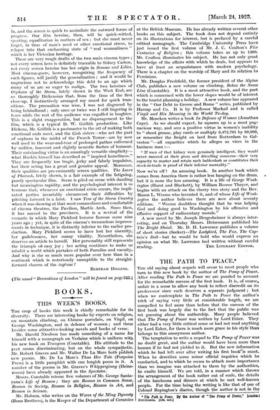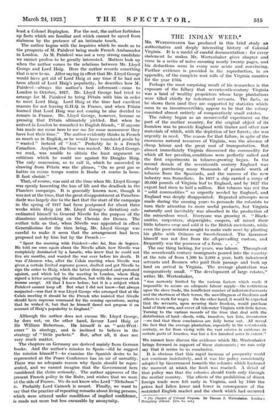THE PATH TO PEACE.*
THE old saying about sequels will occur to most people who turn to this new book by the author of The Pomp of Potter. After reading The Path to Peace we are puzzled to account for the remarkable success of the first book. It is, of course, unfair in a sense to allow any book to reflect discredit on its predecessor since each deserves a separate judgment ; but when we contemplate in The Path to Peace the author's trick of saying very little at considerable length; we are compelled to feel more than before that the success of the first book was largely dim to the fact that the public was set guessing about the authorship. Many people believed that The Pomp of Power was written by Lord Esher. They either had a very little critical sense or had not read anything by Lord Esher, for there is much more grace in his style than belongs to this anonymous author.
The temptation to write a sequel to The Pomp of Power was no doubt great, and the author would have been more than human if he had not yielded to it. But the new information which he had left over after writing his first booeis scant. When he describes some minor official inquiries which he conducted, and to which he seems to attach more importance than we imagine was attached to them by the authorities, he exalts himself.- We are told, in a manner which throws the arrangement of the book rather out of scale, the details of the luncheons and dinners at which he met well-known people. For the time being the writing is like that of one of Colonel Repington's diaries, though the author is not in the • The Palls to Peace. Br the Author of -Do Pomp of hirer," Loudon* Hutchinson. [181. net.] least a Colonel Repington. For the rest, the author furbishes up facts which are familiar and which cannot be saved from staleness by the pretence of an intimate touch.
The author begins with the inquiries which he made as to the prospects of M. Painleve being made French Ambassador in London. As M. Painleve was not a very strong candidate we cannot profess to be greatly interested. Matters look up when the author comes to the relations between Mr. Lloyd George and Lord Haig. Here the author records something that is new to us. After saying in effect that Mr. Lloyd George would have got rid of Lord Haig at any time if he had not been afraid of Lord Haig's popularity, he describes how M. Painleve—always the author's best informant—came to London in October, 1917. Mr. Lloyd George had tried to arrange for M. Painleve to bring Main with him in order to meet Lord Haig. Lord Haig at the time had excellent reasons for not leaving G.H.Q. in France, and when Main learned that Lord Haig was not coming he also decided to remain in France. Mr. Lloyd George, however, became so pressing that Petain ultimately yielded. But when he arrived in London he remarked to English friends, " If anyone has made me come here to use me for some manoeuvre they have lost their time." The author evidently thinks in French as much as in English, or he would have translated perdu by " wasted " instead of " lost." Probably he is a French Canadian. Anyhow, the time was wasted. Mr. Lloyd Georges we read, was unable to obtain the least argument or criticism which he could use against Sir Douglas Haig. The only concession, so to call it, which he succeeded in drawing from Main was the phrase, "On nc peut pas se battre en meme temps contre le Boche et contre la boue. Il faut choisir."
That, of course, was said at the time when Mr. Lloyd George was openly lamenting the logs of life and the deadlock in the Flanders campaign. It is generally known now, though it was not at the time, that the great disappointment at Passchen- daele was largely due to the fact that the start of the campaign in the spring of 1917 had been postponed for about three weeks while Haig (at Mr. Lloyd George's dictation) sub- ordinated himself to General Nivelle for the purpose of the disastrous undertaking on the Chemin des Dames. The author tells us that, when Nivelle was appointed in effect Generalissimo for the time being, Mr. Lloyd George was careful to make it seem that the arrangement had been proposed not by him but by the French :—
" Spent the morning with Painlev6--chez dui, Rue de Seguier. He told me once again about the Nivelle affair, how Nivelle was completely dominated by a fanatic, who knew that he could not live six months, and wanted the war over before his death. It was d'Alenson who, after the Calais meeting when Nivelle was given a certain limited supreme power, drafted and got Nivelle to sign the order to Haig, which the latter disregarded and protested against, and which led to the meeting in London, where Haig signed a letter accepting the situation, but with the reserves of un homme enrage. All that I knew before, but it is a subject which Painlev6 cannot keep oft But what I did not know—but always suspected—was that it was Lloyd George who arranged that at the Calais meeting it should be the French who insisted that Nivelle should have supreme command for the coming operations, saying that he wished it, but that he himself dared not propose it on account of Haig's popularity in England."
Although the author does not excuse Mr. Lloyd George, lie does not, on the other hand, favour Lord Haig or Sir William Robertson. He himself is an " anti-West - erner " in strategy, and is inclined to believe in the strategy of " little packets." But, after all, it does not very much matter.
The chapters on Germany are derived mainly from German books. And the author's mission to Spain—did he suggest the mission himself ?—to examine the Spanish desire to be represented at the Peace Conference has an air of unreality. There was no adequate reason why Spain should be repre- sented, and we cannot imagine that the Government here considered the claim seriously. The author approves of the present French policy in the Ruhr, and wishes that we were at the side of France. We do not know who Lord "Nicholson " is. Probably Lord Carnock is meant. Finally, we want to say that the practice of repeating remarks about living persons, which were uttered under conditions of implied confidence, is made not more but less excusable by anonymity.



































































 Previous page
Previous page